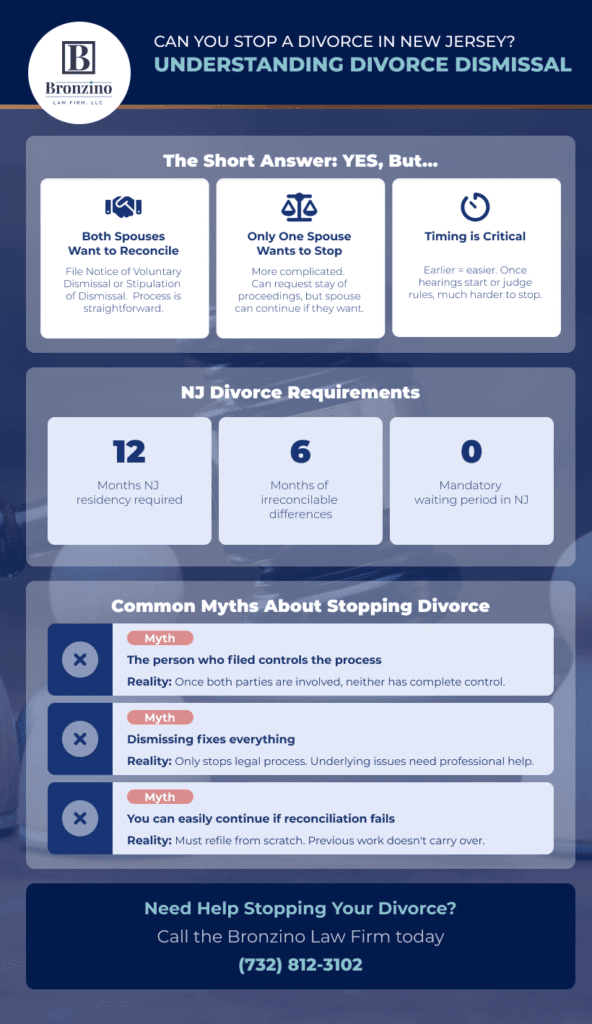New Jersey Divorce Dismissal: Process, Requirements, and Costs

Fortunately, in New Jersey, under the correct circumstances, the divorce process can be halted. Navigating this decision is deeply personal, but it also presents legal challenges. It is not as simple as marching to the courthouse and ripping up the filed petition for divorce. That is why speaking with an experienced New Jersey divorce attorney is essential if you and your spouse are considering reversing course.
From Filing to Service: How NJ Divorce Cases Begin
Every divorce in New Jersey starts with a Complaint for Divorce. This is a formal legal document filed by one spouse (the plaintiff) that outlines the reason for the divorce. New Jersey allows for a no-fault divorce (also known as irreconcilable differences). The requirements to file for a no-fault divorce include that either spouse has lived in New Jersey for at least 12 consecutive months, there is no chance of reconciliation, and the couple has experienced these differences for at least six months.
At-fault grounds for divorce indicate misconduct on the part of one of the spouses (typically the defendant). They include adultery, extreme cruelty, abandonment for a minimum of 12 months, substance abuse, imprisonment for 18 consecutive months or more, deviant sexual behavior, or institutionalization in a mental health facility for at least 24 months.To show these grounds for divorce, evidence will need to be provided to the court.
The defendant will receive a summons to notify them of the legal proceedings officially. Once the complaint and summons are filed, they must be served to the other spouse. This step is critical because it initiates the divorce process and triggers legal deadlines for responding.

The Reality of Reversing Divorce Proceedings in NJ
Yes, in most cases, you can stop a divorce after filing in New Jersey—but the process isn’t always as easy as changing your mind. It depends on where you are in the proceedings, whether your spouse is on board, and what steps have already been taken in court. If both you and your spouse have decided to try again, you are in the best possible position to stop the divorce. When there is a mutual agreement to reconcile, the petitioner (the person who filed) can submit a request to dismiss the case voluntarily if the other spouse has yet to file their counterclaim. However, if a counterclaim has been filed, both parties must sign a petition to dismiss the divorce proceedings. Once the dismissal has been granted, the case is closed.
When one spouse wants to halt the divorce, it can significantly complicate matters. If you filed but your spouse wants to continue with the divorce, you can’t obligate them to reconcile. If they have filed a counterclaim or responded in a way that signals they want the divorce to proceed, the court may move forward, regardless of your desire to reunite. In such cases, the judge’s role becomes more active, particularly when child custody, support, or property issues must be resolved.
Timing also matters. If you have recently filed and your spouse hasn’t responded yet, it is generally easier to dismiss the case. However, once the court schedules hearings, motions are filed, or discovery begins, the process is tougher to manage. When a judge has already ruled on parts of the case, unless both parties agree to a dismissal, you may have no alternative but to carry the divorce to its completion.
The farther along the divorce process goes, the more difficult it becomes to stop. Returning to the train metaphor, as it picks up speed and more of the track is traversed, bringing it to a screeching standstill is less likely and more problematic. It is for that reason that you must act quickly if you are considering a reconciliation. Talk to your spouse openly. Document everything, including informal agreements. Speak to an attorney who understands New Jersey’s divorce laws before making any decisions. They can help you understand your options, protect your rights, and make sure nothing slips through the cracks.
Contested vs. Uncontested Divorce
Not all divorces follow the same path. A case is considered uncontested when both spouses agree on all major issues. When the spouses agree on the division of assets, child custody and support, and alimony, the process moves more quickly and is considerably less costly.
A contested divorce is caused by disagreement on at least one issue. Contested divorces often require more court involvement, including discovery, motion practice, and potentially a trial. These cases can last for months or even years and are harder to stop once they gain momentum. They can also become expensive.
Does New Jersey Have a Mandatory Waiting Period for Divorce?
New Jersey does not have a formal “cooling-off” or mandatory waiting period between the time you file and when the divorce can be finalized. The process itself is controlled by the court’s ability to manage an ever-growing caseload, which may result in a lengthy wait between filing and a final judgment. That time window is frequently when spouses have second thoughts and explore the possibility of staying together.
The Legal Process for Dismissing Your Divorce Case in NJ
If Both Spouses Want to Reconcile
When both parties agree to work on the marriage, stopping the divorce is typically straightforward. You must notify the court of your intent to end the divorce process. If your spouse hasn’t filed a response or counterclaim, you can submit a Notice of Voluntary Dismissal with the court to officially withdraw your divorce petition. If a counterclaim has been filed, both parties will need to sign a Stipulation of Dismissal, which legally confirms your intention to remain married.
If Only One Spouse Wants to Stop the Divorce
Things get more complicated when only one spouse wants to hit the pause button. In New Jersey, one party can move forward with a divorce even if the other has second thoughts. The law doesn’t require mutual consent to finalize a divorce, especially under no-fault grounds like irreconcilable differences. If your spouse is open to reconsidering, you can jointly request a stay of proceedings to give you both time to decide how to move forward. If your spouse insists on continuing the divorce, you will probably have to bite the bullet and prepare for a split.
Consider Mediation or Counseling First
Before filing to dismiss the case, it’s worth exploring mediation or marital counseling. For some couples, counseling reveals a path forward. For others, it confirms that separation is the healthiest option. Either way, the process can bring clarity.
Potential Costs
The court doesn’t charge a specific fee to dismiss a case, but costs may still be incurred. Filing fees and attorney costs cannot be refunded. You may also incur additional costs if you choose to attend counseling or mediation. If you later decide to refile for divorce, you will have to pay a new filing fee and potentially repeat some legal processes.
Essential Considerations Before Dismissing Your Case
Financial Issues May Already Be in Motion
Once a divorce is filed, the process of dividing marital assets, determining spousal support (also known as alimony), and outlining financial responsibilities may already be underway. For example, suppose temporary support orders are in place or assets have been divided as part of a settlement. In that case, it will take time and additional legal steps to reverse the decisions made.
Custody and Parenting Plans Can Complicate Things

Your Spouse May Object
Stopping a divorce requires cooperation from both parties. If your spouse wants to proceed, you cannot dismiss the case without their agreement. When both sides are legally involved, the court treats the matter seriously, and both spouses have a say in how, or if, it proceeds.
Divorce Dismissal Myths: What’s True and What’s Not
- The person who filed for divorce initially controls the process. Once both parties are involved, especially if the defendant has not only responded but also filed their own claims, neither party has control.
- Dismissing the case fixes everything. A dismissal stops the legal process, but it does not address any emotional or other underlying issues that a licensed therapist should address.
- The divorce can continue if things don’t work out.If you later decide to divorce again, you’ll have to refile from the beginning. Any prior filings, deadlines, or agreements won’t carry over automatically.
Consult with Our Brick NJ Divorce Lawyers at Bronzino Law Firm to Understand Your Legal Options for Halting Divorce Proceedings
Having an attorney who understands New Jersey family law can make a huge difference, especially if you’re unsure about how to proceed. We can help you assess the risks of stopping the case, advise you on timing, and ensure that all court procedures are handled properly. We can also help you navigate conversations with your spouse to reconcile or manage disagreements about the next steps.
We will protect your legal rights. If you have already begun negotiating things like spousal support, child custody, or property division, we can create a clear picture of what happens to those discussions if you end the divorce or what safeguards you might need if the relationship does not improve. Legal counsel is especially important if you are considering reconciliation under specific terms, such as returning to the family home or sharing parenting time while you work out the details.
A good attorney also acts as a buffer between you and your spouse when emotions are running high. Whether your spouse is cooperative or hesitant, we will manage communication, negotiate on your behalf, and ensure your goals are clearly and respectfully conveyed.
If you are contemplating filing for divorce, or have already begun the divorce process and would like to explore other options, now is the time to contact the Bronzino Law Firm at (732) 812-3102 . We serve clients throughout Ocean and Monmouth counties, including Lakewood, Asbury Park, Manchester, Holmdel, Toms River, Freehold, Manalapan, Long Branch, Jackson, Red Bank, Berkeley, Middletown, Point Pleasant, Brick, and across the Jersey Shore. You don’t have to do this alone.







